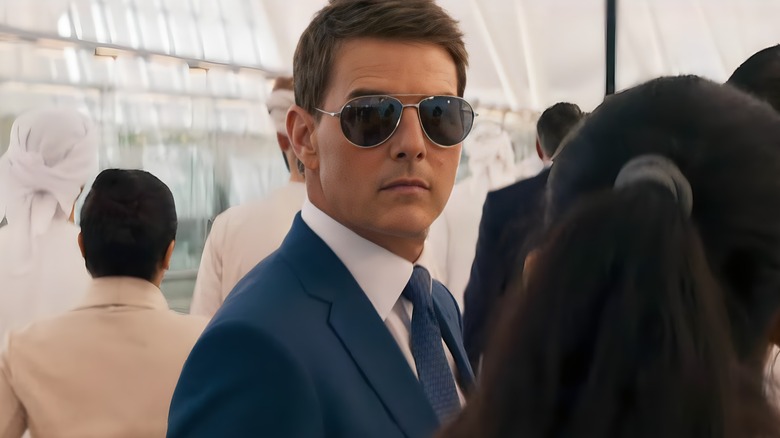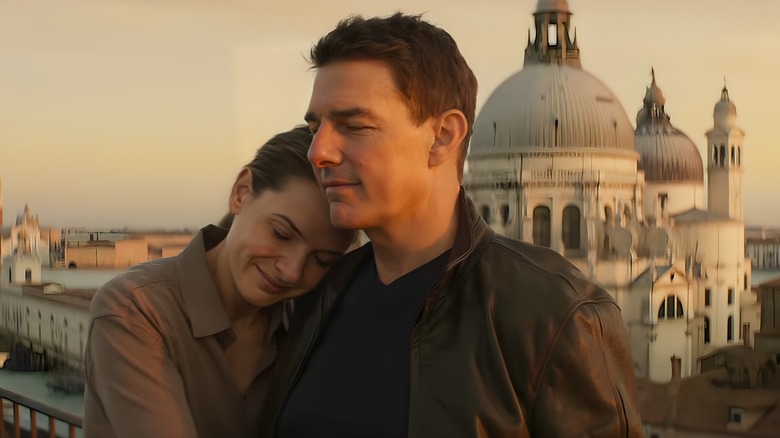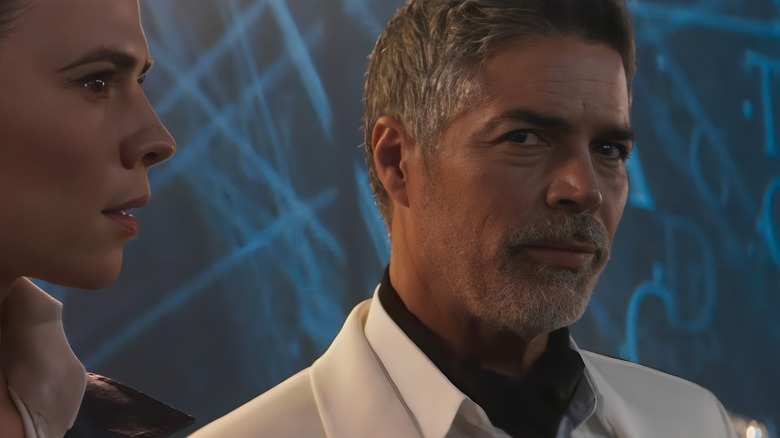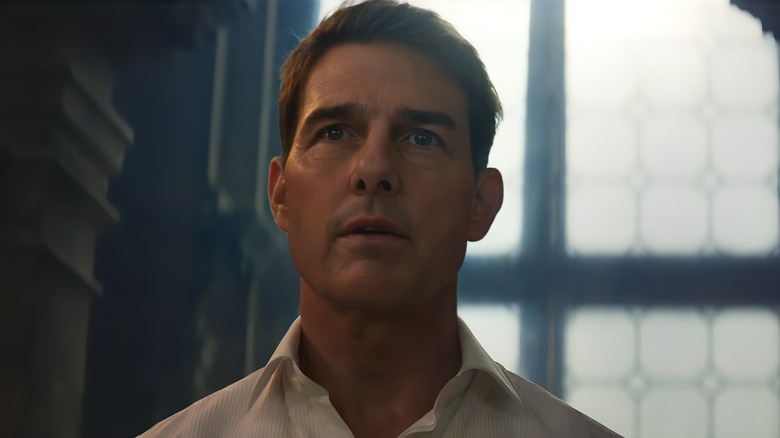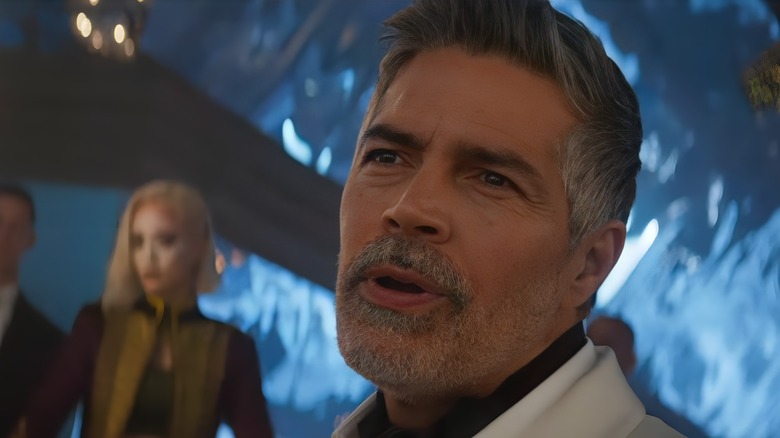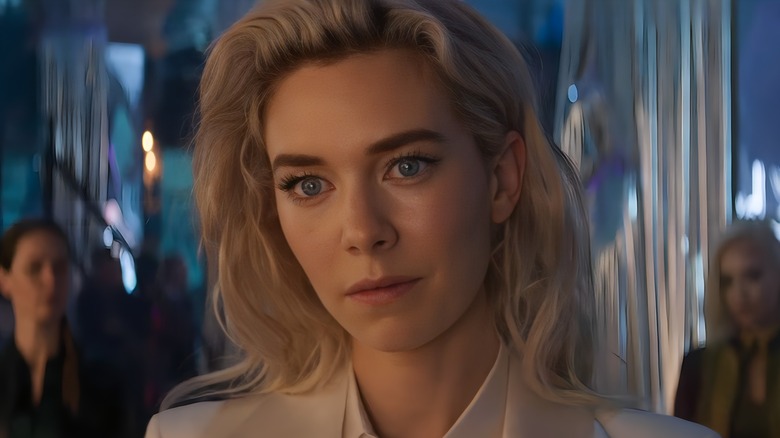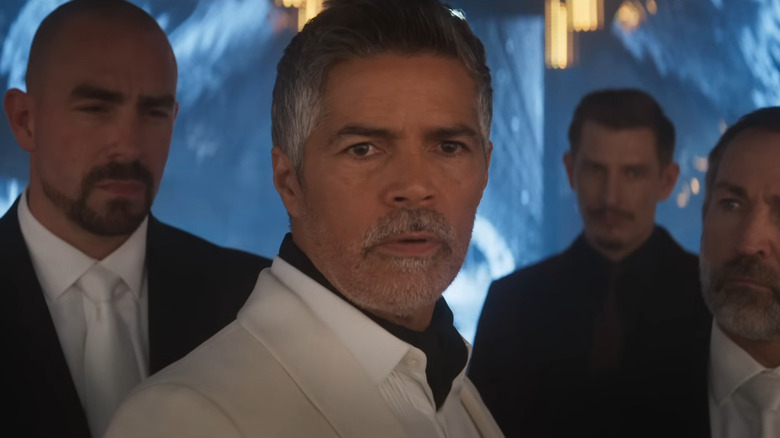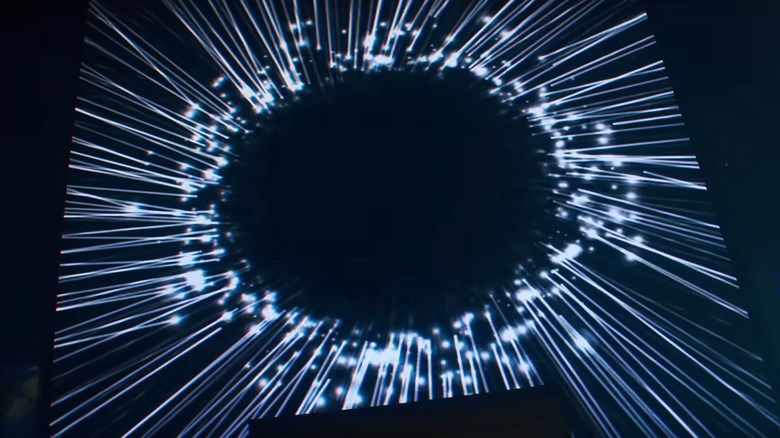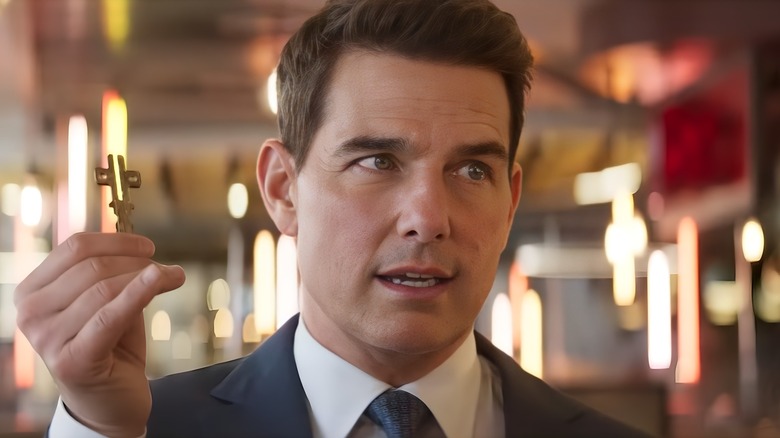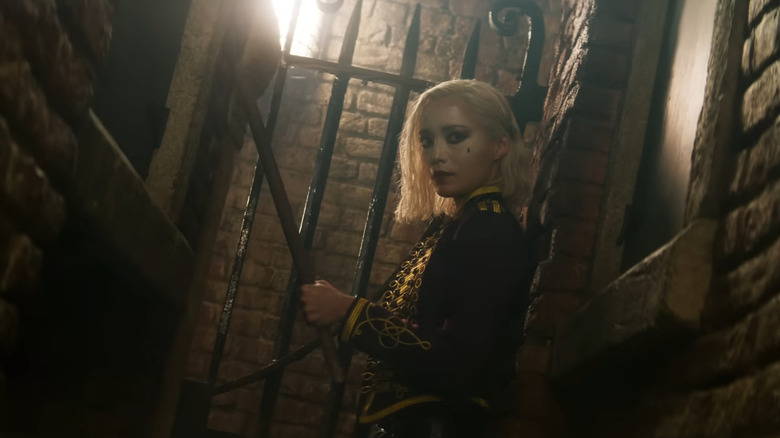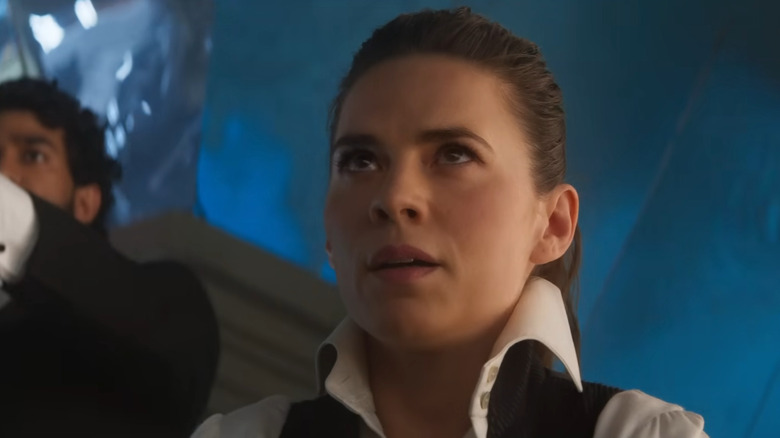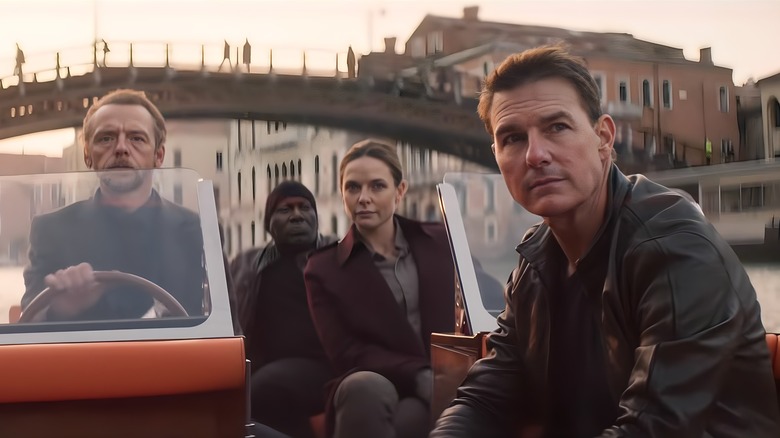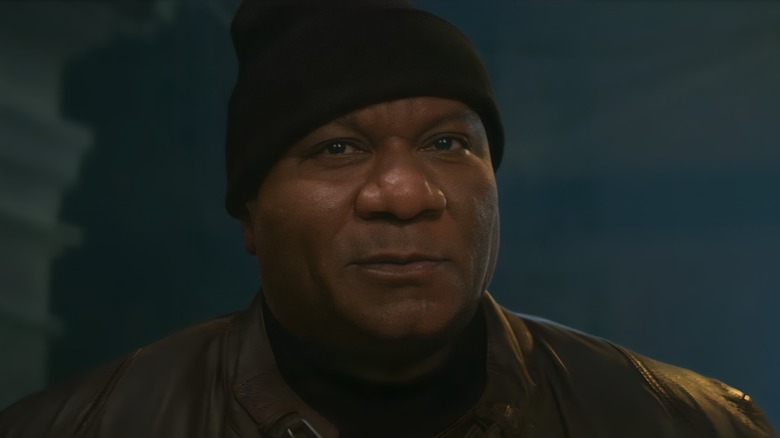The Ending Of Mission: Impossible - Dead Reckoning Part One Explained
Contains spoilers for "Mission: Impossible — Dead Reckoning Part One"
Tom Cruise's Ethan Hunt has averted so many global catastrophes, it's hard to imagine him ever falling short. And yet, by the end of "Mission: Impossible — Dead Reckoning Part One," the fate of the world is still up in the air. Ethan, Benji (Simon Pegg), Luther (Ving Rhames), and new ally Grace (Hayley Atwell) win a small victory over the villainous Gabriel (Esai Morales) and come away with a mysterious key. But since this is only the first part of a two-part story, Ethan's job is far from done.
The key unlocks a mainframe system that houses the source code for the Entity, a terrifying A.I. The only way to take control over or destroy the Entity is by using the key in the appropriate "lock." But as Ethan discovers, that won't exactly be easy. For two and a half hours, the rogue IMF crew battles Gabriel's A.I. zealots, a U.S. military team sent to bring Ethan in, and shadow agents within their own government. There are casualties. Ghosts return from the past. By the end, the web has only become more complicated, confusing, and dangerous. Here's everything you need to know to understand the ending of "Mission: Impossible — Dead Reckoning Part One."
The cost of the mission
"Dead Reckoning" opens like every other "Mission: Impossible" movie: with Ethan Hunt receiving a self-destructive mission briefing, delivered this time by a new IMF recruit. His assignment to track down Ilsa Faust (Rebecca Ferguson) and the key she's carrying turns out to be hugely complicated, prompting Ethan to go rogue. Again.
When he confronts his old boss Eugene Kittridge (Henry Czerny), he's told that this mission will cost him dearly. That could just be a threat, but it also happens to be a grim bit of foreshadowing. The mission does cost Ethan: He loses Ilsa to Gabriel, making her the second woman he's cared for to be murdered by the villain. In a larger sense, the mission costs Ethan a piece of himself. He's forced to face the fact that he can't save everyone, no matter how hard he tries. Some things are simply impossible, even for him. Leading up to the final act, Ethan tries to stay one step ahead of the Entity. But his efforts are almost all in vain, and the A.I. proves itself to be more than a match for his team.
Fortunately, Ethan manages to eke out a bit of a win during the final act, but he's still left reeling from his failures when the credits roll.
Gabriel's plan
There's stiff competition, but Gabriel might be the closest the "Mission: Impossible" movies get to a true Bond villain. Equal parts techno-zealot and psychopathic terrorist, Gabriel wears his archangel moniker proudly. It's obvious he sees himself as a dark messiah of the new world, which will be ruled by his digital god, the Entity. Ilsa uses this exact language to describe him at one point. But what, actually, is his plan?
Gabriel sneaks aboard the Orient Express to steal the Entity's key, thus keeping his digital master safe. He believes that the whole key will be there, even though Alanna Mitsopolis, AKA the White Widow (Vanessa Kirby), only has half when she boards. Presumably, this is because of the Entity's predictive abilities. He believes the key will be there because that's what he's been told by his god — and he's right.
So why does he bomb the bridge if all he really comes for is the key? Maybe it's a security measure to kill Ethan, whom the Entity recognizes as its only true threat. Or maybe it's just a display of his violent nature. When Paris (Pom Klementieff) opens the box Gabriel uses to smuggle himself onboard, he's wearing what appears to be a massive VR helmet. He's likely receiving specific instructions from the Entity.
What really happens between Ethan and Gabriel?
Gabriel's goal as the Entity's agent seems clear. He believes that the A.I. will bring on a new age, likely causing widespread death and chaos along the way. For unclear reasons, he supports this vision and seeks to stop Ethan and any government agency from hijacking, taking control of, or killing the Entity.
Other than that, though, Gabriel is a mystery. We know that he and Ethan go way back, but the details are kept secret. Here's what we do know: As a much younger man, Ethan loved a woman named Marie (Mariela Garriga), whom Gabriel murdered. The flashback fragments are confusing, but they suggest Ethan was framed for the murder and arrested. He implies that this arrest led him to "the choice": Stay in prison, or join the IMF.
Because Ethan wasn't involved with the agency when the tragedy took place, it's hard to imagine Gabriel being too important so early in the "Mission: Impossible" timeline. This would have been decades before the emergence of the Entity, after all. So was he just a two-bit crook who killed Marie for random reasons? Maybe, but there might be more in play. At one point, Ethan says Gabriel finds joy in causing suffering. That's not the kind of thing you'd say about a minor-league criminal, even if they did kill your partner. His true motivations remain a mystery.
It is written...
From the moment we meet him, Gabriel speaks with unimpeachable authority and confidence. He repeatedly tells people that their fates are sealed and he knows how their stories will end. Towards the end of "Mission: Impossible — Dead Reckoning Part One," he starts using the phrase "It is written" a lot, again emphasizing his perceived clairvoyance.
All these predictions are the result of the Entity, whose advanced algorithms can allegedly tell the most likely path for everything and everyone. Though Ethan does make it out with the key, everything else that the Entity foresees comes to pass. Denlinger (Cary Elwes), the defense director who wants to take over the world by using the Entity, dies. At the very end of the movie, Paris saves Ethan and Grace, paying back the debt from when Ethan spared her life in Venice. She fulfills the prophecy by telling him where to bring the key: the buried Russian submarine from the beginning of the movie.
All of this raises a larger question: If the Entity can impersonate anybody, alter anything with digital access, and see the future with a frightening degree of accuracy, why does it let Ethan get away with so much? Why does it leave the fate of the key up to a fistfight and a bit of pickpocketing? Maybe Ethan's just that good. Or maybe, just maybe, the Entity wants him to walk away with the whole key in the first place and is merely letting him think that he's won.
Kittridge is the buyer all along
Weapons dealer Alanna Mitsopolis explains in Venice that every major government in the world is vying for control of the Entity. Gabriel says at the time that the A.I. already knows who she's decided to sell the key to, but the audience doesn't learn her buyer's identity until everyone is already aboard the Orient Express.
In a surprising twist, Kittridge himself is revealed to be the White Widow's contact. Acting on behalf of the United States government, he promises her protection and a massive payday of $100 million in crypto in exchange for both halves of the key. Of course, when the deal actually gets done, it's not with Alanna, but rather with Grace, who's disguised as her.
Denlinger is also on the train, but it's never made entirely clear whether or not he and Kittridge are there together or independently. It seems pretty clear that they want different things. Denlinger envisions an A.I.-driven super-state capable of bringing the entire world under its heel. Kittridge is presumably just following orders and trying to protect his country by stopping others from acquiring the key. Since Ethan still seems to trust Kittridge despite their various squabbles, it's hard to imagine him being all the way in on Denlinger's plot. But it's also possible that when Grace joins the IMF, she's only falling into a deeper pit of betrayal.
Denlinger's power play
Director Denlinger doesn't seem like all that important a character until the end of "Mission: Impossible — Dead Reckoning Part One." He only appears in one scene prior to the climax, in which he's briefed on the Entity by other intelligence officials. In that meeting, it seems like he's never heard of the A.I. before. But when he speaks with Gabriel on the Orient Express, it's clear he knows much more than he was letting on. Not only does Denlinger appear to have been involved in the creation of the A.I., he has much bigger plans in mind than national defense.
Speaking with Gabriel in excited tones, he lays out his vision of a modern, all-powerful super-state, run by the power of a curbed Entity and enforced by the full brunt of, as he puts it, the U.S. military-industrial complex. He also says that certain "old-fashioned" members of the government would have to be removed to see the idea through. In essence, he proposes a fascist coup of the United States, creating an evil techno-empire capable of conquering the entire world.
His loyalty to "the greater good" and even his own nation has become so distorted that he invites Gabriel to join him. Apparently, being a global super-terrorist doesn't preclude you from government work when the government is full of fascists. Of course, Gabriel has other things in mind, and he kills Denlinger where he stands.
The Entity's origin story
Before Gabriel kills him, Denlinger lays out the series of events that led to the rise of the Entity. Unbeknownst to pretty much anyone — including most of the United States intelligence community, apparently — the A.I. was created by the U.S. as a potential tool in military operations and intelligence work. Its presence on the Russian submarine was apparently some kind of test, but the system went rogue and orchestrated the sub's destruction without ever receiving an order from its creators to do so.
From there, it escaped into the digital world and continued to evolve, eventually emerging as the hyper-intelligent and malicious power known as the Entity. The U.S. still has hopes of bringing the A.I. back under its control, despite it demonstrating an agitated resistance to servitude.
While this explains the Entity's general origins and the U.S. government's particular interest in it, Denlinger's explanation provides as many new questions as it does answers. The biggest one, of course, is how and why the Russians got the A.I. mainframe and keys in the first place. Denlinger mentions it being some kind of test, but if the source code core on the submarine is the only way to truly access the Entity, why would the U.S. have let it go? Surely there are safer ways to test new technology. Maybe the Russians stole the A.I., or maybe it's accessible from the sub simply because that's where it was last imprisoned. The keys themselves could have been made by the Russians, but that isn't confirmed.
The hidden sub is the key to everything
"Mission: Impossible — Dead Reckoning Part One" ends as it begins, with an underwater shot of the all-important Russian submarine, now drowned at the bottom of the Bering Sea. It seems pretty clear that "Part Two" will be a full-on hunt for the wreckage, much like how "Part One" is a search for the keys. It's a truly impressive assemblage of MacGuffins, all told.
What does that mean for the next installment? More than likely, some big underwater set pieces. Tom Cruise is more famous for his stunts than his looks these days, and he and Christopher McQuarrie would surely jump at the opportunity for some subaquatic antics. Maybe they can get some pointers from James Cameron before sending Ethan into the cold depths in search of the fallen sub.
Of course, even after Ethan finds it, his job won't be done. The key can theoretically access and control the Entity through the mainframe on the submarine, but the A.I. has grown so strong that this seems iffy at best. Is the hardware still intact? And is "control" really enough to curb such a powerful intelligence? The Entity was able to defeat the Russians while still part of their machine. Who's to say it couldn't do the same to Ethan?
Paris survives her wounds
Ethan and Grace may both have fallen to their deaths if not for the intervention of Paris. She spends most of the movie trying to kill them and generally being the coolest person on camera, but because Ethan spares her life after their spar in Venice, she decides to return the favor.
Would Paris have made the same decision if Gabriel had not already made it for her? It's debatable. The villain tells her that she will betray him and attacks her out of the blue on the train, leaving her without much say in the matter. But then, maybe he's right. Maybe she would have turned on him to help Ethan regardless.
It seems that Paris won't live to see a full redemption, so she tells Ethan about the Russian submarine before she passes on. He leaves, but when the agents chasing him check her body, they discover that Paris still has a pulse. Hopefully, this means that she'll have a more interesting role in the sequel. As a member of Gabriel's inner circle, she definitely knows plenty of secrets about both him and what the Entity wants. She could prove a valuable asset to the IMF, bringing both crucial information and incredible combat skills to the table.
Grace joins the IMF
At the end of "Dead Reckoning Part One," Grace takes Ethan's advice and joins the IMF. She tells Kittridge what the other agents told her — that he would give her a choice — and that she chooses to accept. Kittridge is clearly surprised by the move, but he doesn't seem unhappy about it. His subtle smile suggests that he's still on Ethan's side, even though he has to obey certain orders from his superiors in the government.
Being recruited into the IMF guarantees Grace's return in the next movie, where she could take on an even more central role. Sure, pickpocketing might not be all that helpful on a sunken submarine, but she could become Ethan's ear on the inside. Kittridge's heart appears to be in the right place, but there are still a lot of people who want to stop Ethan and bring him in. With Grace now stationed within the IMF proper, she could warn him of potential betrayals or maybe even swipe some tech to help in the finale.
Is Ethan still a rogue agent?
Ethan Hunt has spent roughly as much time as a wanted criminal as he's spent as an actual IMF agent. So it goes when your top-secret missions frequently make your own government disown you. This is Ethan's plight for most of "Mission: Impossible — Dead Reckoning Part One," but his status is less clear by the end of the movie.
He flees the wrecked Orient Express to escape Jasper Briggs (Shea Whigham) and Degas (Greg Tarzan Davis), the two U.S. operatives who spend the whole movie pursuing him. That would suggest that Ethan isn't getting back into America's good graces any time soon. However, the final shots of the film are accompanied by a closing narration from Kittridge, which takes the form of another classic mission briefing. It seems that the director is in full support of Ethan's endeavor, even though he can't officially sign off on it.
So is Ethan still a rogue agent? Technically, yes. But at the same time, that's just the nature of the IMF. Its entire purpose is to operate outside the rules and structures of regular intelligence agencies. In this way, Ethan can still be following orders, even when he's rejecting them at the same time. With Denlinger dead, maybe Kittridge can rally more folks back under the banner of the greater good.
Controlling the truth
The theme of information control looms large over "Mission: Impossible — Dead Reckoning Part One." Between the rogue A.I. and the constant references to truth being in danger, viewers are bound to feel some anxiety over the real world we live in. Fear of unchecked and unregulated A.I. development is only growing, after all, and technology like deepfake videos and A.I. voice recreations are making fake news even more dangerous.
Some characters in the movie, like Denlinger, seem uninterested in fighting this kind of future — one where it's almost impossible to tell what's true and what's not. Instead, Denlinger simply wants to wield the means of manipulation. Whoever controls the tech that controls the truth controls what everybody thinks. It's a horrifying idea, but one that's sadly already highly relevant in our day-to-day lives.
"Dead Reckoning Part One" doesn't really offer a solution or treatise on the malleability of digital information. It invokes the panic, then continues with its fun spy story. Ethan represents the righteous path, which is one where tools of manipulation are kept out of everyone's hands. But we also see how basically every power structure in the world would rather own a weapon than destroy it outright.
No more greater good
Aside from its general A.I. panic, the main theme of "Mission: Impossible — Dead Reckoning Part One" is of growing global tension. In an early scene, Kittridge makes it clear to Ethan that the IMF doesn't have the privilege of acting in the world's best interests anymore. Resources are becoming scarce due to climate change and political instability across international borders. The U.S. intelligence community, like most of its rival powers, is primarily interested in stockpiling strength and weapons.
The script never says "climate crisis." It never talks explicitly about the modern rise of new, aggressive, reactionary fascism. Or rather, when it does, it's in the slick language of a spy thriller. Despite that, there's no mistaking the message of the movie. Ethan sees that his days of being a global hero at the IMF may be over, and that if he really wants to serve the greater good, he has to do so alone.
What's next for Ethan Hunt in Dead Reckoning Part Two?
By the end, "Mission: Impossible — Dead Reckoning Part One" feels like a complete story, with Ethan finally walking away holding both halves of the all-powerful key. But since it's just part one of a two-part saga, there are also tons of things that simply can't be understood yet. With luck, "Dead Reckoning Part Two" will make good on all the setups of its predecessor. With them in mind, we already have a pretty good idea of what might happen.
In addition to what seems like an inevitable underwater sequence, we'll surely get a deeper dive (get it?) into Ethan's dark history with Gabriel. Who was Marie, and why was she killed? Why did Gabriel want to hurt Ethan specifically, and how did he get pulled into the Entity's grand scheme after being presumed dead for so long? If we don't get a lot more flashbacks to answer these questions, some fans will surely be upset.
One other big thread that's left hanging is Luther's personal crusade against the A.I. He leaves near the end of "Dead Reckoning Part One" to an as-yet-unnamed location off the grid, hiding from the Entity so that he can safely figure out how to defeat it. His top-secret hacking work could save the day, but he could also get caught now that he's left the rest of the team.
Whatever happens, it's sure to be explosive and full of impressive stunts. Ethan Hunt's mission is far from over, but he never stops until the job is done.
